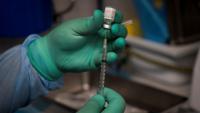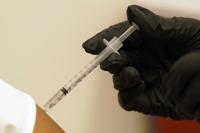
The average person doesn’t need a COVID-19 booster yet, an international group of scientists — including two top U.S. regulators — wrote Monday in a scientific journal.
The experts reviewed studies of the vaccines’ performance and concluded the shots are working well despite the extra-contagious delta variant, especially against severe disease.
Keep scrolling for Biden’s six-part plan to fight the delta variant
“Even in populations with fairly high vaccination rates, the unvaccinated are still the major drivers of transmission” at this stage of the pandemic, they concluded.
After revelations of political meddling in the Trump administration’s coronavirus response, President Joe Biden has promised to “follow the science.” But the review raises the question of whether his administration is moving faster than the experts.
Georgetown University’s Larry Gostin said the paper “throws gasoline on the fire” in the debate about whether most Americans truly need boosters and whether the White House got ahead of scientists.
“It’s always a fundamental error of process to make a scientific announcement before the public health agencies have acted and that’s exactly what happened here,” said Gostin, a lawyer and public health specialist.
The U.S. already offers an extra dose of the Pfizer or Moderna vaccines to people with severely weakened immune systems.
For the general population, the debate is boiling down to whether boosters should be given even though the vaccines are still offering high protection against severe disease — possibly in hopes of blocking milder “breakthrough” infections among the fully vaccinated.
Last week, CDC Director Dr. Rochelle Walensky said new data showed that as delta surged, the unvaccinated were 4.5 times more likely than the fully vaccinated to get infected, over 10 times more likely to be hospitalized and 11 times more likely to die. Still, government scientists are also weighing hints that protection is waning among older adults who were vaccinated early last winter.
The more the virus spreads, the more opportunity it has to evolve into strains that could escape current vaccines. The Lancet reviewers suggest there could be bigger gains from creating booster doses that better match circulating variants, much like flu vaccine is regularly updated, than from just giving extra doses of the original vaccine.
***
THE BIDEN PLAN
Key parts of Biden’s plan to confront the delta variant surge
Intro

Key parts of the plan:
Vaccine mandates

- All federal workers and contractors must get vaccinated, with limited exceptions.
- Private employers with 100 or more workers will have to require them to be vaccinated or tested weekly. Employers must provide paid time off for vaccination.
- About 17 million health care workers in hospitals, clinics and other facilities that accept Medicare and Medicaid payments must get vaccinated.
- Some 300,000 employees of Head Start early childhood education and other federal education programs must get vaccinated
Schools and events

- Governors are urged to require vaccination for school district employees.
- The federal government will continue to follow through with money for widespread testing in schools.
- Stadiums, concert halls and other venues for large events are urged to require proof of vaccination or negative COVID test.

- Federal agencies will lay the groundwork for a smooth booster shot campaign, starting the week of Sep. 20 — if the Food and Drug Administration authorizes or approves the boosters.
Masks and testing

- Mask requirements will continue for interstate travel and in federal buildings. The Transportation Security Administration will double fines on airline, train and other travelers who refuse to mask up.
- The number of pharmacies offering free testing will be expanded to 10,000.
- Walmart, Amazon and Kroger will offer at-home COVID tests at cost, about a 35% savings for consumers.
COVID care

- The Pentagon will double military medical teams helping local hospitals overwhelmed with virus patients.
- Federal agencies will boost shipments of a COVID-19 treatment known as monoclonal antibodies by 50%. Medical teams will be dispatched to help administer the treatments.
Economy

- Top loan amounts for small businesses affected by the pandemic will be increased to $2 million from $500,000 currently.
VIRUS BY THE NUMBERS
The Associated Press Health and Science Department receives support from the Howard Hughes Medical Institute’s Department of Science Education. The AP is solely responsible for all content.
Source: tucson.com/news/national/fda-experts-among-group-opposing-us-booster-shot-plan/article_5fe1b6b0-c322-5a82-97f7-2026c400a4b2.html


